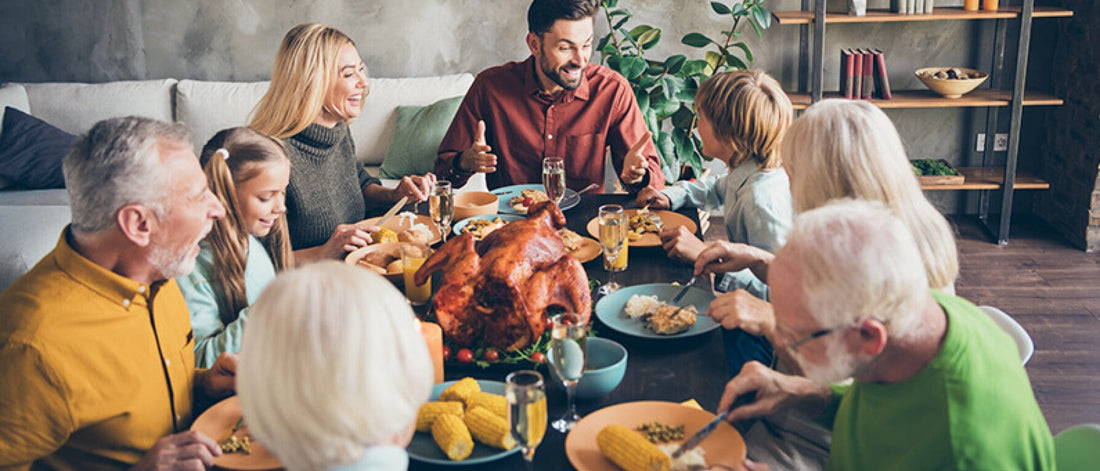Thanksgiving is a time when family and friends come together in celebration of the bigger, more important things in life—a connection to something more significant than the minutia of everyday life. It’s a time for restoration and rejuvenation, as well as merriment and connection with loved ones and family.
Relationships are one of the most crucial aspects of life, and Thanksgiving offers us an opportunity to feel and express gratitude for the relationships we have with our family members. This isn’t to say that families come without struggle, pain, or discord. But with luck, your family provides emotional support during challenging times, encouragement along life’s twists and turns, and the comfort of being known and accepted for who you are. Your family may also offer you the beauty of unique traditions, shared stories, and memories that provide a thread of continuity in an increasingly atomized world.
As you move through the season of gratitude, let’s explore four reasons to be thankful for your family— and the extended family of the community that supports you.
Thanksgiving is an opportunity to reflect on the ways in which your family has supported you during tough times and has been there with you to celebrate good news and triumph over obstacles. If you’re facing a challenging time right now, remember to reach out and share what is happening with your loved ones, even though you may feel embarrassed or even ashamed to talk about it. As author and teacher Brené Brown has described, the willingness to be open and vulnerable is essential to experiencing the deepest levels of connection and love. In her book Daring Greatly, she writes, “What most of us fail to understand and what took me a decade of research to learn is that vulnerability is also the cradle of the emotions and experiences that we crave. … Vulnerability is the birthplace of love, belonging, joy, courage, and creativity. It is the source of hope, empathy, accountability, and authenticity.”
According to Donna Rockwell, PsyD, a licensed clinical psychologist and mindfulness meditation teacher, “We desperately need our traditions. Part of the responsibility of having the chance to live at all—should we choose to look at it that way—is to be a part of the transmission of our particular family and ethnic customs. In so doing, we honor past generations by passing on their rites and rituals to the next generation. In this way, our family lineages stay stable and strong. Since ceremonies outlive us, they make us feel part of that larger sense of things as we pass them down to our own children, and theirs. That is how we realize our immortality—not in living forever, but in being part of living traditions.”
Rockwell notes that traditions can act as a compass, providing guidance for your relationships and personal interactions, the experiences of your family life, and, ultimately, the development of societies. As you recognize family traditions, you get a glimpse of what’s shaped you into the person you are, and that can help guide you to continue to grow and evolve.
Family relationships can serve as a mirror in which you’re better able to see who you are, accept what you see, and seek to heal what needs to be healed. When you feel “triggered” or have a knee-jerk reaction to something a family member says or does, consider it an opportunity to investigate and learn more about yourself. Ask yourself, “What quality or trait is this person displaying that is causing such a strong reaction in me?” Once you identify that quality, consider the possibility that you also possess that quality but have, up until now, been unwilling to acknowledge it. Usually, the traits that we recognize most strongly in others are ones that we have ourselves. The Mayans say lak’ech to greet each other, meaning, “I am another you.” If you recognize this truth, then your world will become clearer—like a mirror—reflecting many insights and opportunities for growth within yourself.
Thanksgiving isn’t just about the delicious food and pumpkin pie, but rather it is a time of celebration to honor and appreciate your connection and relationship to family. The gifts and opportunities that come with family relationships can be a treasure trove if you are willing to stay open to learning, take responsibility, and commit to doing the work. The evolving dance of these relationships can be joyful, discouraging, painful, frustrating, thrilling, crushing, and completely worth it. As you move through this season of gratitude, may these reflections give you an abundance of reasons to be thankful for the unique and priceless gifts of family.
*Editor’s Note: The information in this article is intended for your educational use only; it does not necessarily reflect the opinions of the Chopra Center's Mind-Body Medical Group; and is not a substitute for professional medical advice, diagnosis, or treatment. Always seek the advice of your physician or other qualified health providers with any questions you may have regarding a medical condition and before undertaking any diet, supplement, fitness, or other health programs.
Discover the simplest, most effective way to cultivate calm and well-being—so you can help others find peace as well—with Breathwork, our self-paced online course. Learn More.
Relationships are one of the most crucial aspects of life, and Thanksgiving offers us an opportunity to feel and express gratitude for the relationships we have with our family members. This isn’t to say that families come without struggle, pain, or discord. But with luck, your family provides emotional support during challenging times, encouragement along life’s twists and turns, and the comfort of being known and accepted for who you are. Your family may also offer you the beauty of unique traditions, shared stories, and memories that provide a thread of continuity in an increasingly atomized world.
As you move through the season of gratitude, let’s explore four reasons to be thankful for your family— and the extended family of the community that supports you.
1. You Are Alive
Let’s start with the fundamental blessing of life. If you’re reading this article, you have received enough care and nourishment to be alive in this very moment. You have been fed, nourished, and sheltered by your family, whether it’s the one you were born into or a family that became yours along the way. You have also learned how to read, and you have access to a computer. You even have the wisdom to be exploring ways to be grateful this season, which shows a high level of emotional intelligence. In addition, there’s a multitude of other gifts you have received that have helped you to be who you are now: an amazing person living in a field of infinite possibilities. With all this in mind, take a moment of appreciation to reflect on the miracle of being alive and the blessings of this human incarnation.2. You Are Loved and Supported
At some point, we all face pain and hardships, such as illness, financial setbacks, breakups, layoffs, and loss. In the face of tough times, your family can offer you love, emotional support, and encouragement to persevere. Consider the times that members of your family have helped you through a difficult situation. Perhaps they comforted you when you felt lost, listened to you with acceptance and non-judgment, drove you to appointments, offered material support, shared practical wisdom, or helped you navigate a tough decision. There are so many ways in which the love and support of family help carry us through life’s challenges.Thanksgiving is an opportunity to reflect on the ways in which your family has supported you during tough times and has been there with you to celebrate good news and triumph over obstacles. If you’re facing a challenging time right now, remember to reach out and share what is happening with your loved ones, even though you may feel embarrassed or even ashamed to talk about it. As author and teacher Brené Brown has described, the willingness to be open and vulnerable is essential to experiencing the deepest levels of connection and love. In her book Daring Greatly, she writes, “What most of us fail to understand and what took me a decade of research to learn is that vulnerability is also the cradle of the emotions and experiences that we crave. … Vulnerability is the birthplace of love, belonging, joy, courage, and creativity. It is the source of hope, empathy, accountability, and authenticity.”
3. You Get to Honor Family Traditions
Can you think of any family traditions you experienced as you were growing up that affected you in positive, memorable ways that carry over to today? Or can you recall happy and memorable moments or traditional activities with family that bring you joy and a sense of belonging? I remember doing a Thanksgiving Day run every year with my family. We would get up early, do a five-mile run, and work up a huge appetite for the remainder of the day. We were so excited for the delicious meal waiting on the dinner table at my grandparents’ house. The smells of cooked turkey and the sweet potato casserole my mom made, the green beans with slivered almonds, the two types of stuffing—it all felt so special. We came together for a full day of eating and soaking in all the connections of those who made up our family—nuclear and extended—all under one roof. It’s through these types of experiences that you learn more about who you are and where you come from.According to Donna Rockwell, PsyD, a licensed clinical psychologist and mindfulness meditation teacher, “We desperately need our traditions. Part of the responsibility of having the chance to live at all—should we choose to look at it that way—is to be a part of the transmission of our particular family and ethnic customs. In so doing, we honor past generations by passing on their rites and rituals to the next generation. In this way, our family lineages stay stable and strong. Since ceremonies outlive us, they make us feel part of that larger sense of things as we pass them down to our own children, and theirs. That is how we realize our immortality—not in living forever, but in being part of living traditions.”
Rockwell notes that traditions can act as a compass, providing guidance for your relationships and personal interactions, the experiences of your family life, and, ultimately, the development of societies. As you recognize family traditions, you get a glimpse of what’s shaped you into the person you are, and that can help guide you to continue to grow and evolve.
4. You Can Learn Through the Mirror of Relationship
Every relationship has its own purpose and lessons to teach. And everyone you see is a reflection of yourself in some way. Inevitably, you learn a lot about who you are through other people. Even the most difficult relationships help you learn and grow, and they offer an invitation to get curious about the unpleasant parts.Family relationships can serve as a mirror in which you’re better able to see who you are, accept what you see, and seek to heal what needs to be healed. When you feel “triggered” or have a knee-jerk reaction to something a family member says or does, consider it an opportunity to investigate and learn more about yourself. Ask yourself, “What quality or trait is this person displaying that is causing such a strong reaction in me?” Once you identify that quality, consider the possibility that you also possess that quality but have, up until now, been unwilling to acknowledge it. Usually, the traits that we recognize most strongly in others are ones that we have ourselves. The Mayans say lak’ech to greet each other, meaning, “I am another you.” If you recognize this truth, then your world will become clearer—like a mirror—reflecting many insights and opportunities for growth within yourself.
Thanksgiving isn’t just about the delicious food and pumpkin pie, but rather it is a time of celebration to honor and appreciate your connection and relationship to family. The gifts and opportunities that come with family relationships can be a treasure trove if you are willing to stay open to learning, take responsibility, and commit to doing the work. The evolving dance of these relationships can be joyful, discouraging, painful, frustrating, thrilling, crushing, and completely worth it. As you move through this season of gratitude, may these reflections give you an abundance of reasons to be thankful for the unique and priceless gifts of family.
*Editor’s Note: The information in this article is intended for your educational use only; it does not necessarily reflect the opinions of the Chopra Center's Mind-Body Medical Group; and is not a substitute for professional medical advice, diagnosis, or treatment. Always seek the advice of your physician or other qualified health providers with any questions you may have regarding a medical condition and before undertaking any diet, supplement, fitness, or other health programs.
Discover the simplest, most effective way to cultivate calm and well-being—so you can help others find peace as well—with Breathwork, our self-paced online course. Learn More.






















